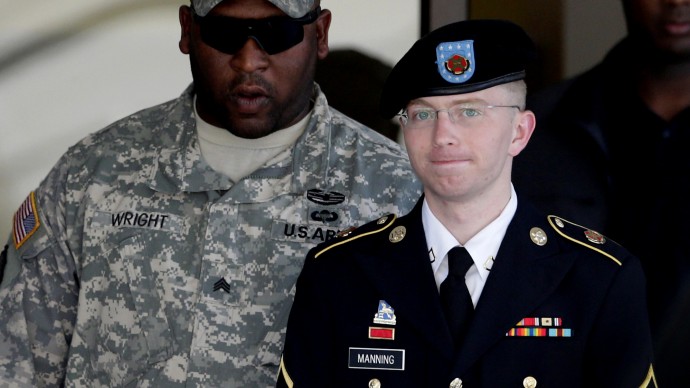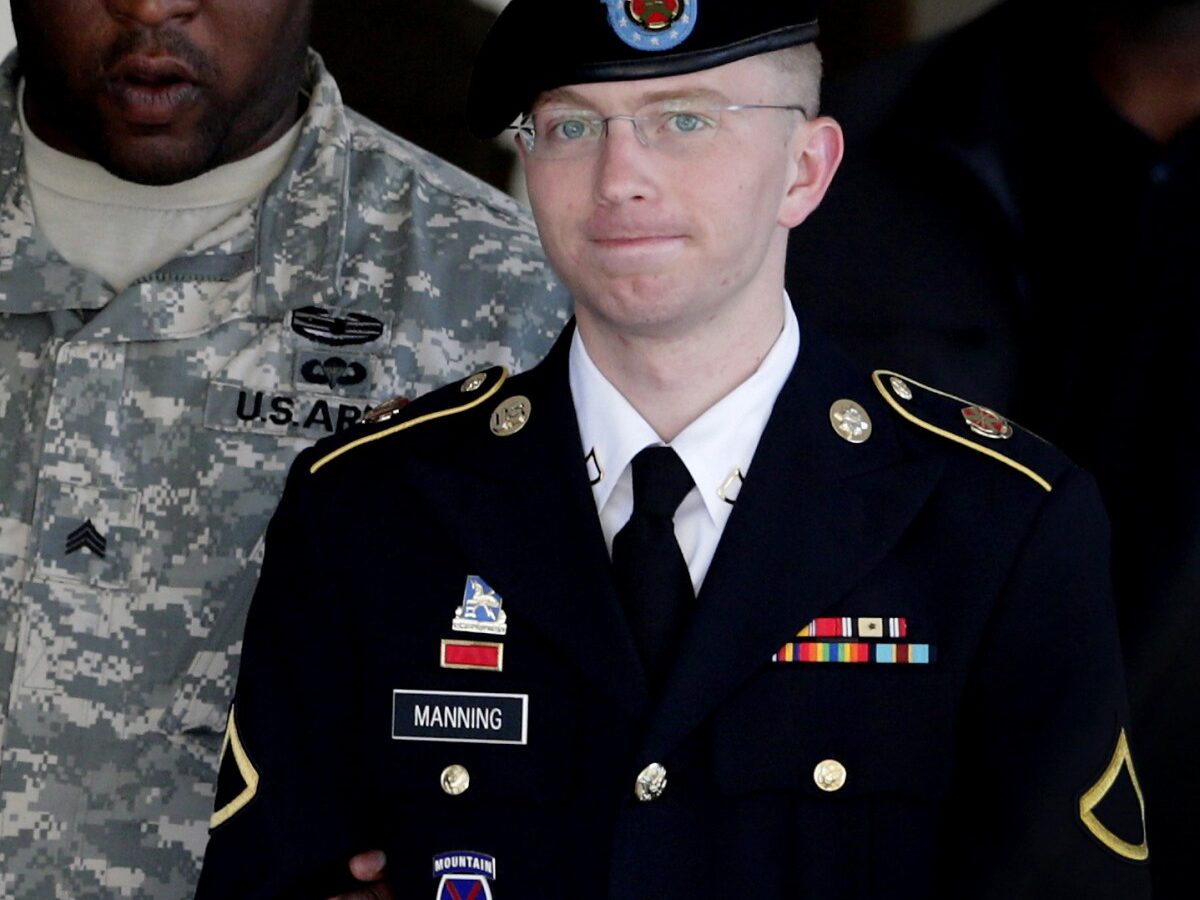
(MintPress) – For former United States Army Pfc. Bradley Manning, another milestone will come and go today. For over two-and-a-half years – 900 days to be exact – Manning has been detained by the U.S. without trial for his alleged involvement in leaking classified information on the Iraq War to whistleblowing organization WikiLeaks.
In response, Manning’s civilian defense lawyer David Coombs submitted a plea on behalf of Manning this week, looking to remove some of the nearly two dozen charges he faces, including aiding the enemy – a capital offense.
This week has been particularly important for Manning, as it has begun pretrial hearings regarding Coombs’ claim of a lack of speedy trial, but also the first response in handling the charges made against Manning. In a plea deal sought on Wednesday, Manning agreed to plead guilty to some aspects of the charges he is facing in exchange for lesser charges filed against him from the government. In a statement issued after the pretrial hearing, Coombs clarified what his intent is when submitting a plea to the military court, which operates with far more technicalities than traditional civilian or criminal courts.
“PFC Manning has offered to plead guilty to various offenses through a process known as ‘pleading by exceptions and substitutions,’” Coombs wrote in a statement. “To clarify, PFC Manning is not pleading guilty to the specifications as charged by the Government. Rather, PFC Manning is attempting to accept responsibility for offenses that are encapsulated within, or are a subset of, the charged offenses. The Court will consider whether this is a permissible plea.”
Coombs emphasized that the plea submission was not part of an agreement with the government, but rather a legal formality that could be exercised when actual trial motions begin – presumably this winter. Coombs made sense of the strategy in his statement, essentially saying that he and Manning were simply trying to test the waters of what their options could be and if their tactics would pass through the legal threshold of the court.
“The Government does not need to agree to PFC Manning’s plea; the Court simply has to determine that the plea is legally permissible,” Coombs explained. “If the Court allows PFC Manning to plead guilty by exceptions and substitutions, the Government may still elect to prove up the charged offenses. Pleading by exceptions and substitutions, in other words, does not change the offenses with which PFC Manning has been charged and for which he is scheduled to stand trial.”
Significant step
Manning served as an intelligence analyst during his time with the Army, where he aggregated classified and sensitive data and sent it to Julian Assange and his WikiLeaks outfit. Arguably the most provocative piece of evidence leaked by Manning was a video of the series of airstrikes from a U.S. Apache helicopter on July 12, 2007. Dubbed “Collateral Murder,” the video showed U.S. pilots shooting at a group of nine to 11 men, most of whom were unarmed. Assange credits the video for contributing to the call to end the Iraq War.
By submitting the plea, Manning is acknowledging his involvement with the released cables for the first time. That’s a significant step toward gauging how the rest of the trial will go, says Andrew Blake, who has followed the trial for RT. During Wednesday’s pretrial hearing, Manning also expressed that he was electing to have a trial by a military judge rather than a jury of military officers.
“The reason this is a big deal is that Manning is roughly charged with two dozen counts right now and if convicted on them … they would go for the maximum term,” Blake said. “But what we’re looking at now is that Manning may be willing to accept responsibility for taking these hundreds of thousands of sensitive military documents … and supplying them to Julian Assange’s WikiLeaks site. Coombs put in a plea notice on behalf of Manning that said essentially, ‘We’re willing to perhaps plea to this if you want to forget about that.’”
Josh Gerstein covers courts and transparency issues for Politico. Gerstein speculated that the plea could be an indicator that Manning and Coombs feel that the case is “overcharged” and that a handful of the 22 charges should simply be dropped. Throughout the spring and summer, Coombs attempted to waive 10 of the 22 charges against Manning because he felt the U.S. government was not disclosing evidence it had that would have benefited the defense.
The Army judge overseeing the hearing, Col. Denise Lind, heard arguments from Coombs that the government was improperly using deadlines set aside to provide assessments of the impact of Manning’s alleged leaks to withhold information that would benefit the defense for impacts that only help the prosecution. While Lind did ultimately order the government to hand over confidential documents related to WikiLeaks, Coombs was unsuccessful in having any of the charges dropped. It is unclear whether the issue will be revisited before the court martial trial begins on Feb. 4.
Not-so-speedy trial
One of the primary arguments made throughout the case by Coombs has been the government’s sluggish handling of the matter. Despite being held in the government’s custody for 900 days, Manning’s trial has seen little in terms of advancement, and his plea deal may have been the most notable event to stem from the limited pretrial motions.
Coombs has lambasted the process thus far, pointing out that the speedy trial clause in the Sixth Amendment has not been followed. He said the U.S. has been so slow to respond to the Manning case that the situation has been “an absolute mockery of [Manning’s] fundamental right.”
The Bradley Manning Support Network, a grassroots organization that accepts donations to help with Manning’s lawyers’ fees, said the constant delays in the trial are only advantageous to the prosecution and cost Manning both money and time.
“Suspending the pretrial process is only to the government’s advantage. The defense is paid by grassroots donations from around the world, and two and a half years of delays have pushed legal expenses to nearly $250,000,” the organization wrote. “… This trial is anything but speedy, and the government has thus far enjoyed total immunity for violating Bradley’s basic rights. It’s long been time for that to change.”
Efforts to contact the Bradley Manning Support Network went unreturned.
Manning’s Constitutional rights would seem to be in blatant violation if following the Rules for Courts-Martial (R.C.M.) protocols. R.C.M. 707 states that an arraignment must happen within 120 days of the initial arrest. Blake said that by the time Manning’s actual trial begins, he could be detained for over eight times the legal length stated in the R.C.M.
“His court-martial with formally begin, supposedly, in February and by the time it wraps up he’ll probably be behind bars for 1,000 days at that point without actually finishing the trial,” Blake said.
Manning has become a catalyst for activism across the country, as calls for his release from detention have been popular among Occupy demonstrations, the “May Day” events from earlier in the year and the anti-NATO demonstrations in Chicago. Earlier this year, Manning was nominated for a Nobel Peace Prize, and he has been the subject of numerous fundraising drives made possible by the Bradley Manning Support Network.
Activists for Manning have also taken to speeches made by President Barack Obama. Last spring, 10 activists paid $5,000 each to attend an Obama fundraiser, only to heckle the president during his address. The activists began singing aloud, “But at another location in this country/Alone in a 6×12 cell sits Bradley/23 hours a day is night/The 5th and 8th Amendments say this kind of thing ain’t right.”


